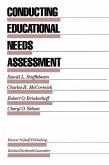Emphasizing the comparative aspects of research, this introduction to educational research traces the process through five stages-choosing what to study, including specifying the research problem; collecting information; organizing and summarizing information; interpreting results; and reporting the outcomes. Each of the stages offers diverse options available to researchers for solving the problems of that stage, and a research project checklist at the end of each chapter guides readers in applying the chapter's contents to their own research studies. In much educational discourse, comparative education has referred solely to the study of educational similarities and differences between regions of the world or between two or more nations. This book uses the broader definition of the term to encompass a large body of research including studies focusing on comparisons between local educational systems, schools, classrooms, language groups, religious denominations, genders, social classes, and individual students. Students who are planning research projects as well as staff members of such organizations as ministries of education, school systems, bureaus of educational research, and educational aid agencies will find this volume indispensable.
Hinweis: Dieser Artikel kann nur an eine deutsche Lieferadresse ausgeliefert werden.
Hinweis: Dieser Artikel kann nur an eine deutsche Lieferadresse ausgeliefert werden.








